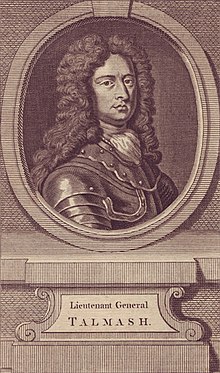Thomas Tollemache

Thomas Tollemache (Talmash or Tolmach) (c. 1651 – 1694) was an English soldier.
Early life
He was the second son of Sir Lionel Tollemache of Helmingham, Suffolk and his wife, Elizabeth, 2nd Countess of Dysart.[1] After the death of his father, his mother remarried in 1672 to the John Maitland, Duke of Lauderdale who became his stepfather.
Military career
In 1678, he became captain in the Guards, with which he served in English Tangier with the Tangier Garrison; in 1685 he was made lieutenant-colonel of a regiment of fusiliers, but gave up his commission shortly after the accession of James II.[1]
Glorious Revolution
Tollemache abandoned King James in favour of the Protestant William of Orange who, in 1688 successfully usurped the English throne during the Glorious Revolution. For his services to William, now King William III, he was made governor of Portsmouth and colonel of the Coldstream Guards; in 1689 he was chosen an English member of parliament.[1]
Ireland and Flanders
He served with his regiment during the War of the Grand Alliance, seeing action at the Battle of Walcourt in August 1689. In 1691 he served in Ireland with the rank of major general fighting on the Williamite side against the Jacobite Irish Army. He gained fame at the Battle of Aughrim and at the sieges of Athlone, Galway and Limerick. Following the Treaty of Limerick and the Flight of the Wild Geese he returned to serve on the Continent. In the Netherlands he added to his high reputation with his conduct at the battles of Steenkirk and Neerwinden.[1]

Raid on Brest
In 1694 Tollemache proposed, and led, an expedition against the French port of Brest. The French however, had gained intelligence of the proposed attack and had reinforced the garrison and strengthened the port's defences. The ensuing Battle of Camaret was disastrous for the English - although he led his troops with great gallantry, they were beaten off with heavy losses. Tollemache, himself wounded, succumbed to his injuries, later dying in Plymouth in June 1694. He was buried in the church of St Mary's, Helmingham, Suffolk.[1]
Notes
References
- This article incorporates text from a publication now in the public domain: Chisholm, Hugh, ed. (1911). "Tollemache, Thomas". Encyclopædia Britannica. Vol. 26 (11th ed.). Cambridge University Press. p. 1053.
- Wauchope, Piers. "Tollemache , Thomas (c.1651–1694)". Oxford Dictionary of National Biography (online ed.). Oxford University Press. doi:10.1093/ref:odnb/27500. (Subscription or UK public library membership required.)
- Lloyd, Ernest Marsh (1898). . In Lee, Sidney (ed.). Dictionary of National Biography. Vol. 56. London: Smith, Elder & Co.
- Use dmy dates from April 2012
- 1651 births
- 1694 deaths
- People from Mid Suffolk District
- Coldstream Guards officers
- English generals
- Younger sons of earls
- Williamite military personnel of the Williamite War in Ireland
- 17th-century English soldiers
- Tollemache family
- English MPs 1689–1690
- English MPs 1690–1695
- Soldiers of the Tangier Garrison
- Alumni of Queens' College, Cambridge
